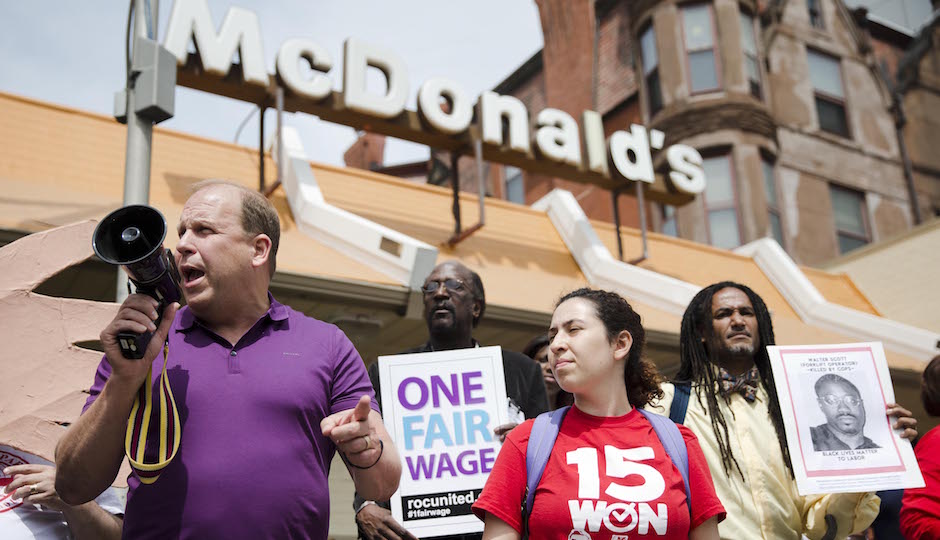Op-Ed: 7 Ways To Fight Poverty In Philly

Pennsylvania State Sen. Daylin Leach and activists call for the minimum wage to be raised at a rally in May. | Photo by Matt Rourke/AP
(Editor’s note: This is an opinion column from Community Legal Services attorneys Sharon Dietrich and Louise Hayes.)
Philadelphia continues to have the highest rate of deep poverty among the country’s 10 biggest cities, the Inquirer reported last week. A whopping 186,000 Philadelphians — 12 percent of the city’s residents — live below 50 percent of the federal poverty line. That’s $12,000 or less a year for a family of four. What’s more, more than one in four of our neighbors throughout the city live below the poverty level.
Our perpetual high poverty rate has many causes, including:
- The inadequate supply and availability of jobs for low-income people who need them, and the inadequate wages paid in the few jobs that are available.
- The 63 percent decline in participation in the Temporary Assistance for Needy Families (TANF) program following “welfare reform” in 1997. TANF now provides cash assistance to only 70,000 low-income families with children statewide.
- The elimination in 2012 of the General Assistance program, which provided $205 per month for 90,000 Pennsylvanians who cannot work and who have no other source of income.
Widespread poverty is a problem for the city as a whole, not just the individuals in need. All of the top issues facing Philadelphia — education, public safety, economic development — are affected by poverty. Reducing poverty is not just a moral issue (although it is that). The city’s future also depends on it.
But what can be done to attack the structural reasons that so many Philadelphians have been paralyzed by poverty? Here’s a policy framework that addresses the defining feature of poverty: the lack of adequate income.
- Create subsidized jobs. There are simply not nearly enough jobs in Philadelphia for everyone who wants and needs one, even in the low-wage sector. From May through September 2010, the “Way to Work Philadelphia” program allowed 13,000 adults and young people to work in jobs funded by stimulus dollars. Although that money has ceased, the city and state can repurpose other funding streams — from economic development, workforce development, reentry and welfare line items — to create jobs. These jobs would not only put money in people’s households, but would also provide work history and could be geared toward activities and employers supporting the public good.
- Seal minor criminal records automatically. Too many Philadelphians cannot get jobs because of old criminal records that deter employers from hiring them. A state legislative initiative called “Clean Slate” would seal old convictions from the public without the need for individual petitions. Non-violent misdemeanors would be sealed after 10 years; summary offenses, after 5 years. Cases not resulting in conviction would be sealed shortly after resolution. This concept, which enjoys bipartisan support, is expected to be introduced in a bill shortly. Clean Slate will allow many thousands of Pennsylvanians who do not present a public safety risk to finally overcome their criminal record barrier and get to work.
- Raise the minimum wage. For working people in deep poverty, their low earnings are a primary culprit. The minimum wage here is $7.25 per hour, which has not increased since 2007. Meanwhile, all of the states surrounding Pennsylvania — Delaware, Maryland, New Jersey, New York, Ohio and West Virginia — have increased their minimum wage rates, belying the argument that increasing ours would be anti-competitive. Raising the wage to $10.10 would benefit 135,640 Philadelphians, or 23.5 percent of the city’s workforce. It would also reduce government benefits costs, as the public sector would no longer compensate so much for substandard wages.
- Make sure that work pays for single moms on TANF. TANF is Pennsylvania’s sole remaining cash assistance program, available only to very low-income families with children. Currently, TANF recipients who go to work lose 50 percent of the value of their earnings through cuts in their TANF checks. Pennsylvania should follow the lead of neighboring states and disregard 75 percent of earnings of TANF recipients, which would pull a part-time worker on TANF out of deep poverty. Gov. Tom Wolf could do this at a cost of less than $5 million per year.
- Eliminate the waiting list for child care subsidies. Currently, if a single mom gets a job, she must find a way to pay for child care on her own for several months until she reaches the top of the waiting list for child care subsidies. Many mothers lack the family supports that will provide free or low-cost care while they wait — preventing them from taking jobs at all, or causing them to lose them quickly.
- Raise the TANF grant amount for the first time since 1990. The value of a TANF grant has declined by 45 percent since 1990. If the $403 monthly grant amount for a mom and two kids had increased with inflation, it would now be $734 per month — still only 44 percent of the poverty level, but far better than the 24 percent of poverty level this grant is now worth.
- Restore the safety net for the most vulnerable among us. The elimination of the General Assistance program has been catastrophic for people unable to work due to disabilities, the need for intensive substance abuse treatment, domestic violence, or caregiving responsibilities, leaving these people with no cash income at all. An alternative replacement program is desperately needed, such as a temporary income support for people applying for SSI disability benefits or a subsidized jobs program.
Sharon Dietrich and Louise Hayes are lawyers with Community Legal Services, a Philadelphia-based civil legal aid program.